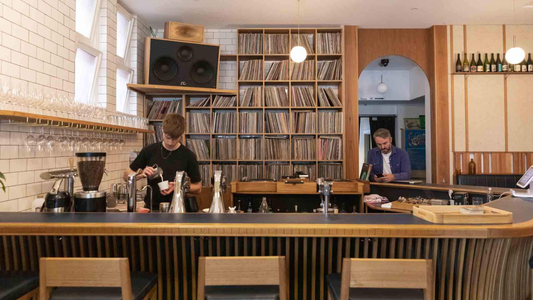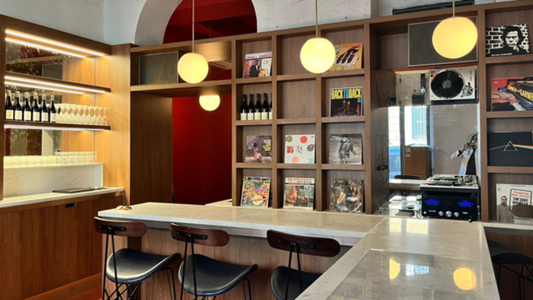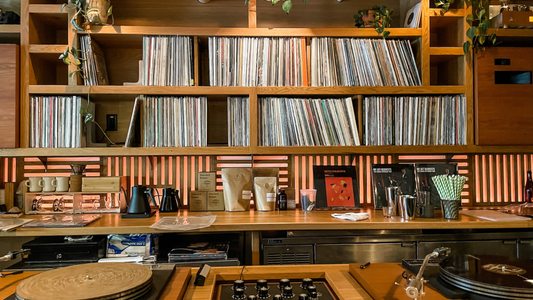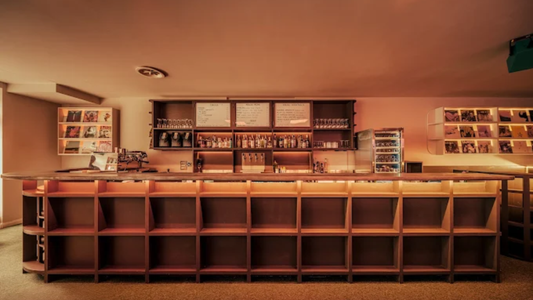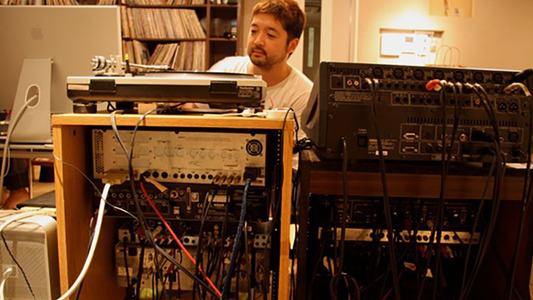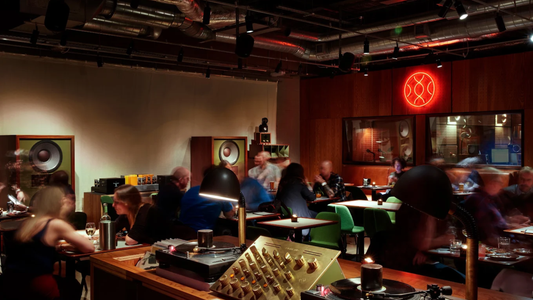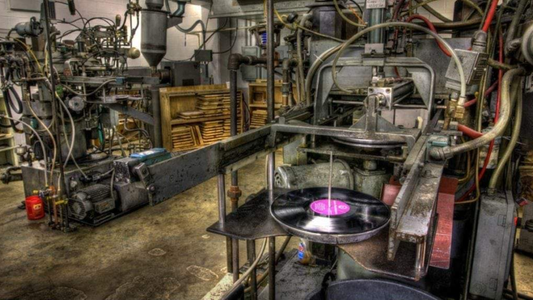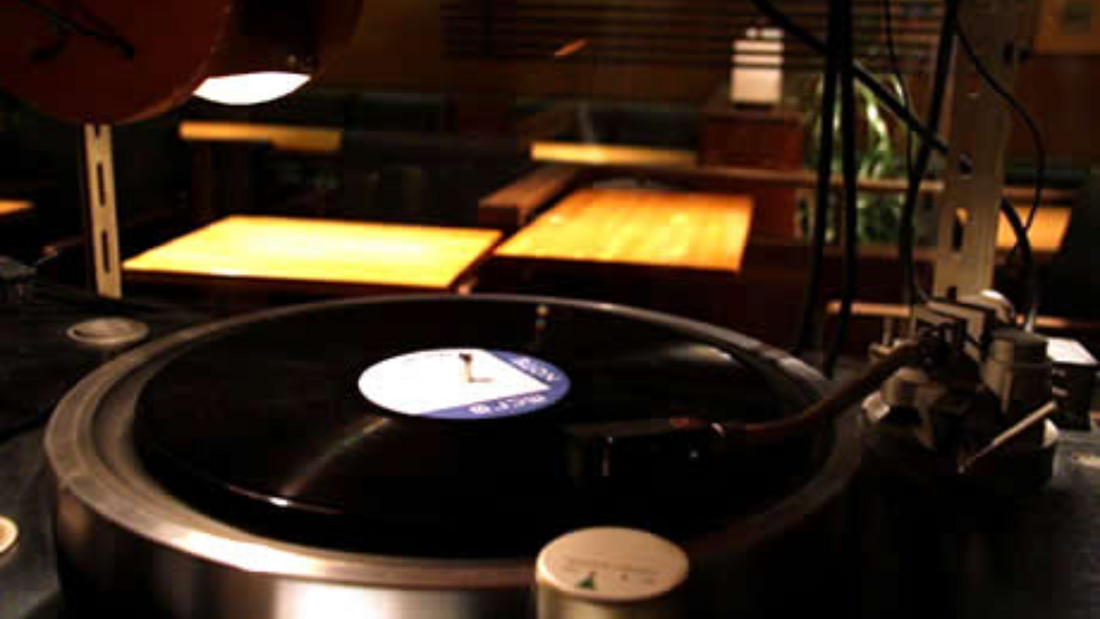
The Silent Hours: Eagle’s Half-Century of Jazz Devotion
By Rafi Mercer
New Listing
Eagle is one of Yotsuya’s most venerable jazz kissaten — explore more in our Tokyo Music Venues guide.
Venue Details:
Venue Name: Eagle
Address: 1 Chome-7-18 Yotsuya, Shinjuku City, Tokyo 160-0004, Japan
Website: Not available
Phone: Not available
Spotify Profile: Not available
Some rooms feel like they have been waiting for you your whole life. When you finally step inside, the atmosphere is so complete, so assured in its identity, that you understand instantly you are entering a continuum rather than a novelty. Eagle, a jazz kissa founded in 1967, is one such room.
It sits discreetly near Yotsuya station, its entrance unmarked by anything other than a simple sign. Inside, the space feels carved out of another era. The air is dim and amber, filtered through decades of cigarette smoke that have long since left their stain on the wood and fabric. The shelves are stacked high with records, spines faded with use, the patina of a life spent in service to sound.
At the centre are the JBL studio monitors — towering, uncompromising, relics of an age when fidelity meant power married to clarity. Through them, the music doesn’t just play; it commands. A Coltrane solo roars like fire. A Bill Evans chord hovers like smoke. The monitors have been tuned to perfection, the room arranged around their needs, and every note they deliver feels authoritative, almost absolute.
There is ritual here, codified over half a century. From the moment you walk in, you are expected to fall in line with the bar’s rhythm. Silence is enforced until the clock strikes six in the evening. Until then, the room is a sanctum for listening. Patrons sit alone or in pairs, nursing coffee or whisky, eyes closed or fixed on the speakers, bodies stilled in respect. The only sound beyond the music is the faint crackle of vinyl and the shuffle of the selector moving from one record to another. Conversation, if it must happen, waits.
And when six arrives, voices return in low murmurs, but never so loud as to disturb. The music remains sovereign, the backdrop against which all else must bend. It is an etiquette that feels almost radical in today’s world of constant chatter, and yet it is precisely this discipline that makes Eagle transcendent. By drawing a line, by demanding attention, the bar ensures that listening is not diluted. It becomes once again a sacred act.
The collection spans the breadth of jazz history, but there is a particular emphasis on the great recordings of the mid-20th century — Blue Note, Prestige, Impulse!, ECM. Japanese pressings abound, their fidelity unmatched, their jackets worn from years of handling. The selectors know these records intimately, and they string them together not with flashy transitions but with the quiet logic of deep knowledge. One side of a record is played in full before another is chosen. The room breathes with the music’s natural arc.
Hospitality is understated but essential. Coffee is strong and unadorned, served in heavy ceramic cups. Whisky is poured generously, the good stuff offered without fanfare. There are light snacks, simple but satisfying, there to sustain rather than distract. The staff are neither aloof nor ingratiating; they are guardians, present to maintain the sanctity of the room.
Eagle’s consistency is legendary. More than fifty years on, the standards have not slipped. The speakers are still immaculate, the records still treasured, the etiquette still enforced. This endurance makes Eagle more than a bar — it makes it a cultural institution, a living archive of Tokyo’s sonic history. To sit here is to connect not just with the music, but with the generations who have sat before you, listening to the same records through the same speakers, under the same rules.
For newcomers, the strictness can be jarring. There is no tolerance for idle chatter or phone scrolling. This is not a place to socialise first and listen second. But for the true devotee, that discipline is precisely the gift. Eagle reminds us what it feels like to be immersed completely, to give oneself to the sound without distraction.
The acoustics of the room support this immersion. The space is neither too large nor too small, its proportions allowing the JBLs to project with both force and nuance. Surfaces absorb and reflect in just the right measure. There is no muddiness, no harshness, only clarity and weight. You hear not only the notes but the space between them, the silences that shape the sound.
Walking back out into Yotsuya after a night at Eagle feels almost violent. The city’s noise crashes in, harsh and indiscriminate. But you carry with you the echo of the room — the memory of having sat in true stillness, surrounded by sound as it was meant to be heard. Few places in the world offer such purity of listening. Fewer still have offered it, without compromise, for more than half a century.
Eagle is not for everyone. But for those who care about music, who want to understand what it means to give yourself wholly to listening, it is essential. It is not just a bar; it is a rite of passage.
Explore More
See our Listening Bar Collection
Rafi Mercer writes about the spaces where music matters. For more stories from Tracks & Tales, subscribe or click here to read more.
